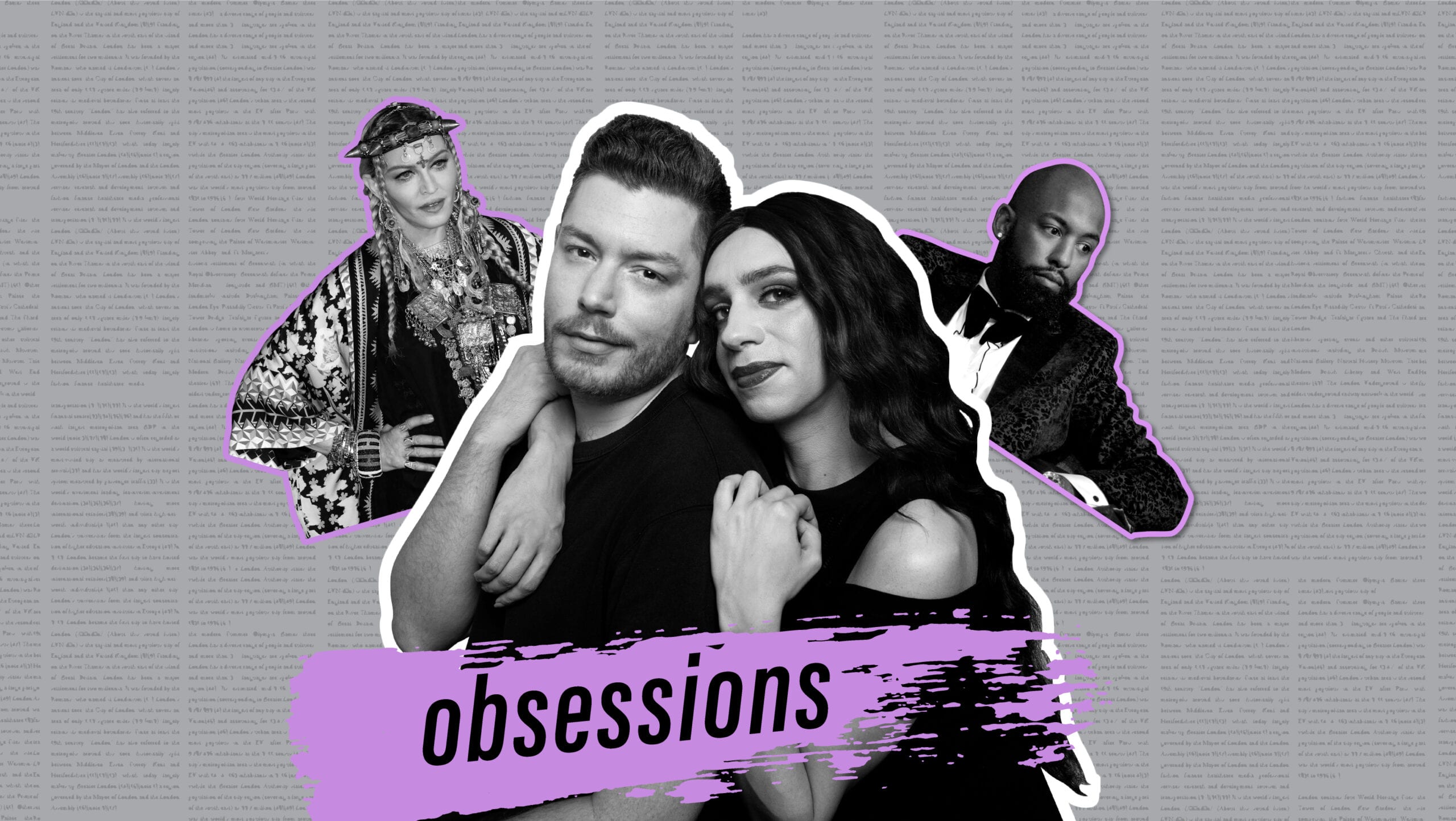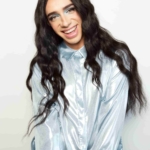Obsessions celebrates the pop culture fixations of queer, cosmically-destined BFFs Thomas Leblanc and Tranna Wintour, hosts of the CBC podcast Chosen Family.
Madonna is about to begin the final dates of her Madame X Tour, bringing an end to what will be remembered as the strangest, most confusing era in her career. It started back in April of 2019 when she posted the following on Instagram:

“Madame X is a secret agent. Traveling around the world. Changing identities. Fighting for freedom. Bringing light to dark places. She is a cha cha instructor. A professor. A head of state. A housekeeper. An equestrian. A prisoner. A student. A teacher. A nun. A cabaret singer. A saint. A prostitute.”
This pseudo manifesto was a hot mess. Why are three of the Madame X identities variations on “teacher” (cha cha instructor, professor, teacher) when there are so many other job opportunities out there, like sales clerk or barista?
And it just got messier and messier—from the reveal of the jarring album cover (which I now think is quite beautiful) to the eye patch Madonna decided would be Madame X’s signature look. The album’s launch was marred by Madonna’s bizarre interviews and public statements, the most notorious being a New York Times piece in which she said she “felt raped” when songs from her 2015 album “Rebel Heart” were leaked. She later said she felt “raped” by the Times piece because it was (mildly) critical of her comparing the leak to rape. It made me long for the days when she was calling herself Esther and drinking Kabbalah water.
And then there’s the Madame X tour: She has cancelled more dates on this one than she has in her entire career. Serious injuries have meant that she has cancelled some performances just hours before showtime, with very little regard for the fans who have spent a ton of money on tickets and travel. Most singers profess, “I would be nothing without my fans,” but it has always seemed to me that Madonna’s attitude is “my fans would be nothing without me.” Madonna is probably the ultimate obsession of my life. But to me, being a fan doesn’t mean uncritically worshipping an idol. To quote Marie Kondo, “I love mess.”
And the tragedy of this mess is that it’s buried what is actually a brilliant piece of art. I can’t think of another recent album that has kept me coming back for more the way Madame X has. I admit that, at first, I thought it was the worst thing she’d ever done—and I still can’t listen to “Killers Who Are Partying,” which is the actual worst. But each of Madonna’s mini disasters have made me want to listen to the album again and understand where she’s coming from. And with each listen, a new layer is revealed.
The album captures Madonna at a particularly challenging moment in her life and career. She has been worshipped as a queen for so long and I think, as someone who has observed her over an extended period, it’s very difficult for her to accept getting older, to accept that she is no longer at the centre of the pop culture universe. At my live shows I ask the audience who’s listened to Madame X, and the majority don’t even know that the album exists—and these are often queer audiences. I think Madonna has, sadly, always associated relevance with popularity, and the decline in her popularity has been destabilizing. You can hear it on the album.
Ultimately, there are only two Madame X identities that emerge fully-formed on the album: the desperate attention seeker and the artist. The attention seeker is a kind of pop vampire, feasting on the life force of young, popular artists. Here she’s chosen Maluma, Quavo, and Anitta, and their collaborations are the worst tracks on the album. When the artist—the person who isn’t concerned about being popular or having a top ten hit—steps up to the plate, the results are surprisingly great. These are the moments that warrant your attention: “Crave” is a moment of understated magic, “I Don’t Search I Find” is a sleek return to the house beats and sensuality of Erotica and “Come Alive” is probably the most unabashedly joyful she’s been since 1984.
The most interesting song is “Looking For Mercy.” In a moment of rare introspection, Madonna asks God to teach her how to love, how to forgive and how to be forgiven. Even though she can seem oblivious to her own demons (namely her extreme narcissism), “Looking For Mercy” points to some kind of deep self-understanding.
I wish Madonna could understand that it’s not possible for any artist to remain at the centre of pop culture forever. She was at the centre for longer—and more successfully—than anyone else. From 1983 (her debut album Madonna) to 2006 (the Confessions Tour), the zeitgeist blew from her (shout out to those who get that Absolutely Fabulous reference). Her music, so much of which is shamefully overlooked, has always been overshadowed by her antics. But if she could finally learn to let the music speak for itself, she would find the acclaim and appreciation that seems to elude her these days.
— Tranna Wintour

Why are we attracted to certain people and not others? This question, as old as romance, is at the centre of Netflix’s new dating reality show, Love is Blind. A new spin on The Dating Game and The Bachelor by way of The Voice and Flirty Dancing, the trainwreck of a series is hosted by celebrity couple Nick and Vanessa Lachey. A New Yorker critic called it offensive to human dignity because it is utterly disconnected from how actual feelings work. And as said critic remarked, this is key to its success.
On Love is Blind, participants—all cisgender, in their twenties and thirties and matched in heterosexual couplings—chat about life, their home states and, mostly, getting married in the age of “left swipes.” But there’s a twist: In the initial getting-to-know-each-other phase, they never see their interlocutors. After establishing mutual interest, each man and woman sit in adjacent “pods” with their potential mate on the other side of a wall.
In order to see their prospective partner in the flesh after just a few days of courting, the man has to propose to the woman. (Only one woman dared to defy this old-fashioned and sexist rule.) After they meet, the couples take off to Cancun to see if they find physical chemistry. All contestants are hotter than average, even Kelly and Kenny, the absurdly “normal” duo of the bunch.
The lack of physical diversity was raised by many viewers on social media: Why select only good-looking candidates if the show is about testing people’s ability to go beyond appearances? The Cut was also quick to point out that there is no need for women to dress in skimpy reality TV garb if the point of the show is not about looks. The viewers’ annoyance is good news, though, because it means that audiences are demanding less of the same.
On their early dates, all the participants have to vibe off each other is their voices. One great discovery, in the first episode, is that the human voice is actually packed with information about people. Culture, confidence level, regional accents, gender expression—the participants are saying much more than words to each other. Spoilers ahead: Jessica, the villain of the season who settles for her second choice after getting ditched by the jock, speaks in a mousier voice to men than to women. Through conversations, pairs “fall in love” and mention that they have never experienced anything as profound as this in the dating world.
Unsuprisingly, Love is Blind is so hetero that it should be called Love is Straight. Only one participant is introduced as queer: Carlton has dated both men and women. (He also appeared on Real Housewives of Atlanta.) He says he’s now ready to settle down with a woman, and this is where the show really gets interesting.
After falling for Diamond, a female contestant, he wonders if he should disclose his sexual orientation before he proposes (before seeing her, remember?) and risk a quick rejection, or after, when they can talk face-to-face. In the end, he opts to disclose to her after meeting to reassure her in person that his desire for men is a thing of the past (is it really, though?).
When they get to Cancun, Carlton begins to act defensively, only engaging in the smallest of small talk. When he finally opens up to Diamond, she is shocked by the revelation. The conversation makes for heartbreaking television, with Carlton angrily crying even though Diamond tries to be supportive.
Carlton is afraid of turning off Diamond, but I suspect he was sabotaging their nascent bond by pushing her away. They spend the night apart and when they meet again, all hell breaks loose. The couple delivers an epic fight. Carlton accuses Diamond of rejecting him because of his “truth,” while she is hurt because he chose to keep his romantic past a secret until after they got engaged—she feels he lied by omission. “I feel like both of our hearts and who we truly are got overshadowed by assumption, defense and pride,” Carlton said in an interview after it all went down.
The situation between Carlton and Diamond is a prime example of how toxic masculinity doesn’t only hurt women, but also men. Carlton is afraid that he is less of a man in the eyes of a woman because he has been with men before.
Since I came out as polyamourous, I’ve been thinking more about what I want from a partner or a hook-up. Thinking of the people I’m attracted to, I’ve also reconsidered my own sexual orientation. I came out as gay twenty years ago, when it was clear that I was attracted to actor Ryan Phillippe (his exposed butt in Cruel Intentions rocked my world). But as a teenager, and even as a young man, I have sometimes set aside romantic feelings for women because I thought exactly what Carlton fears on Love is Blind: A straight woman would never be interested in dating a queer man.
By far the most explosive story arc on Love is Blind, Diamond and Carlton’s dynamic is a reminder of how much we still have to do to deconstruct the heteronormative limitations that exist within all of us.
— Thomas Leblanc



 Why you can trust Xtra
Why you can trust Xtra


